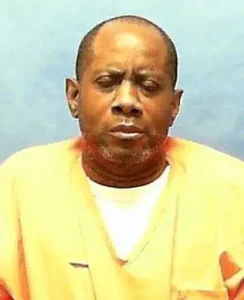Steven Evans was sentenced to death by the State of Florida for the murder of Kenneth Lewis
According to court documents Steven Evans and accomplices would kidnap Kenneth Lewis who would be beaten and murdered
Steven Evans would be arrested, convicted and sentenced to death
Steven Evans Photos

Steven Evans FAQ
Where Is Steven Evans Now
Steven Evans is incarcerated at Union Correctional Institution
Steven Evans Case
Steven Maurice Evans was tried and convicted in 1999 for the first-degree murder and kidnapping of Kenneth Lewis in 1996. Evans was sentenced to death for his participation in the crimes. The trial was delayed when Evans was found not competent to proceed on two occasions and had to be hospitalized. At the final competency hearing, two experts opined that Evans was competent to be tried. A third expert concluded that he was not competent. After hearing testimony from the three experts, the trial court found Evans competent to stand trial.
Evans, Lewis, and two other individuals, Edward Francis and Gervalow Ward, traveled together from Orlando to Sanford to commit a home invasion robbery on a purported drug dealer. The robbery was called off when Lewis abandoned his companions and drove off in the getaway car, which was owned by Evans’ girlfriend’s brother. The other three men went to the nearby home of an acquaintance, Mark Quinn. Evans called his girlfriend Shana Wright and warned her that Lewis might be coming to her apartment. Evans instructed Wright to call the police and report the car stolen, and to remove her money from the apartment. Evans, Francis, Ward, Quinn, and another man named Blaine Stafford went to Wright’s apartment and waited for Lewis. When Lewis entered the apartment, the men jumped him, beat him, and bound and gagged him. When the police arrived to investigate the stolen vehicle report, the men took Lewis to a back room of the apartment.
After the police left, Evans fashioned a homemade silencer from a shampoo bottle stuffed with plastic bags and taped it to the barrel of a .22-caliber pistol. Evans instructed Ward to check the backyard for any witnesses. Then Evans, Francis, and Ward walked Lewis to a culvert behind the apartment building. Evans told Lewis that they were the last three people he would leave behind and that they were the last people he would see on earth. Evans then placed the gun to Lewis’s head and fired six shots. Five of the shots entered Lewis’s head.
Francis was tried and convicted for the same crime and was sentenced to life imprisonment. Francis testified against Evans at the 1999 trial. Ward pled guilty to the lesser charge of kidnapping and received a ten-year negotiated sentence. Ward also testified against Evans at trial. The other individuals involved in the case were not charged with any crimes. Stafford testified at Evans’ trial; Quinn did not. Evans was convicted of premeditated first-degree murder. At the penalty phase, Evans presented evidence about his childhood and teenage years as a member of a Jehovah’s Witnesses congregation. He also presented evidence of two childhood head injuries, a change in personality after the second injury at age nineteen, and several incidents of “out of control” behavior after he consumed alcohol. At age twenty-two or twenty-three, Evans committed adultery and was disassociated from the Jehovah’s Witnesses. Evans was twenty-eight years old at the time of this crime.
The jury recommended a sentence of death by an eleven-to-one vote. At the Spencer1 hearing, Steven Evans requested that no additional mitigating evidence be presented and asked the court to follow the jury’s recommendation and impose a death sentence. The trial court followed the procedure mandated in Koon v. Dugger, 619 So.2d 246, 250 (Fla.1993), and considered all of the mitigating factors, including those proffered pursuant to Koon. The trial court found five aggravating factors: (1) the murder was committed by a person under sentence of imprisonment; (2) Evans had been previously convicted of a felony involving the use or threat of violence; (3) the murder was committed during a kidnapping; (4) the murder was especially heinous, atrocious, or cruel (HAC); and (5) the murder was committed in a cold, calculated, and premeditated manner without any pretense of moral or legal justification (CCP). The court gave substantial weight to the statutory mitigator of extreme mental or emotional disturbance and some weight to the statutory mitigator of impaired capacity to appreciate the criminality of his conduct. The court also found five nonstatutory mitigators related to substance abuse (given little weight by the court because there was no evidence that Evans had consumed a particular amount of alcohol or drugs on the night of the murder) and fifteen related to family, community, and character issues (given little weight because these occurred long before the crimes). Evans asserted a number of other nonstatutory mitigating factors that the court gave no weight.
https://caselaw.findlaw.com/court/fl-supreme-court/1156088.html









